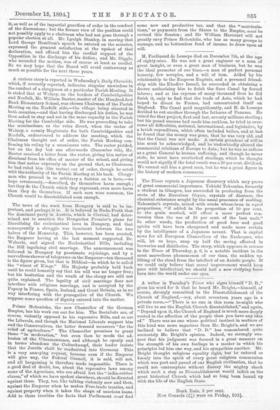A writer in Tuesday's Times who signs himself "D. D.,"
gives his word for it that he heard Mr. Bright,—himself, of course, strongly committed to the Disestablishment of the Church of England,—say, about seventeen years ago in a private room,—" There is no one in this room to-night who will live to see the English Church disestablished," and again, "Depend upon it, the Church of England is much more deeply rooted in the affection of the people than you have any idea. of." There was no one whose political instinct in matters of this kind was more sagacious than Mr. Bright's, and we are inclined to believe that "D. D." has remembered quite accurately Mr. Bright's opinion. Indeed, we strongly sus- pect that his judgment was formed in a great measure on the strength of his own feelings in a matter in which his principles led him one way, and his sympathies another. Mr. Bright thought religious equality right, but he entered so keenly into the spirit of every great religions communion which was part and parcel of our English civilisation, that he could not contemplate without dismay the mighty shock which such a step as Disesta,blishment would inflict on the great historical Church which had so long been bound up with the life of the English State.








































 Previous page
Previous page